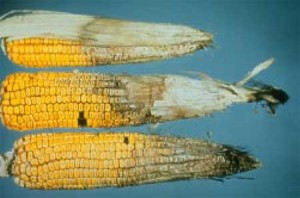11th December 2012
By Sayer Ji
Contributing writer for Wake Up World
Over 30 years ago, scientists observed mycotoxin contaminated animal feed (grains) interfering with normal sexual development in young female pigs, resulting in estrogenic syndromes and precocious puberty. Recent human research in the U.S. is now confirming that the contamination of our food supply with fungal toxins is adversely affecting the sexual development of young girls.
Grains, once considered the foundation of the USDA’s food pyramid, have recently come under scrutiny due to their purported evolutionary incompatibility (e.g. Paleodiet), their co-option by biotech and agricultural corporations (e.g. Monsanto’s Franken-Corn), as well as the fact that they convert to “sugar” within the body, to name but a few of a growing list of concerns. But there may be a more underlying problem affecting all grains, including both organic and conventional varieties, that Nature herself produces, and it goes by the name of Mycotoxins.
[pro_ad_display_adzone id=”110028″]
What Are Mycotoxins?
Mycotoxins are toxic secondary metabolites produced by organisms of the fungi kingdom, commonly known as molds. If you eat grains, or grain-fed animal products, there is a good chance you are already being exposed because mold infestation and mycotoxin contamination affects as much as one-quarter of the global food and feed supply.[i]
Food contaminated with mycotoxins can cause acute, even life-threatening adverse health effects. As recently as April 2004, in Kenya, an outbreak of aflatoxicosis, caused by aflatoxin contamination in corn, resulted in 317 cases and 125 deaths.[ii] When samples of the corn were evaluated for levels of aflatoxin, 55% of the maize products tested had aflatoxin levels greater than the Kenyan regulatory limit of 20 parts per billion, ranging from 100 ppb (35%) to 1 part per million (7%).
While it is remarkable that these exceedingly low concentrations can have deadly effects, the absence of acute signs and symptoms of mycotoxin poisoning does not necessarily mean you are not being affected. Indeed, much lower, harder to detect, concentrations of various mycotoxins are capable of profoundly disrupting endocrine function in exposed population, likely contributing subclinically to many other chronic degenerative health conditions.
Mycotoxins as Endocrine Disruptors
A groundbreaking study published in the journal The Science of Total Environment in 2011 found that the estrogen-disrupting mycotoxin known as zearalenone (ZEA), produced by the microscopic fungus Fusarium graminearum, was detectable in the urine of 78.5% of New Jersey girls sampled, and that these Zea-positive girls, aged 9 and 10 years, “tended to be shorter and less likely to have reached the onset of breast development.”[iii]
ZEA mycotoxins originate in grains such as corn, barley, oats, wheat, rice and sorghum,[iv] but also travel up the food chain to grain-fed meat, eggs and dairy products, and are even found in beer. Indeed, the researchers were able to find an association between the young girls’ urinary levels of ZEA and their intake of commonly contaminated sources such as beef and popcorn.
Interestingly, derivatives of ZEA mycotoxin have been patented as oral contraceptives. Also, according to a recent article “[zearalenone] has been widely used in the United States since 1969 to improve fattening rates in cattle by increasing growth rate and feed conversion efficiency. Evidence of human harm from this practice is provided by observations of central precocious puberty. As a result, this practice has been banned by the European Union.” Other research has confirmed the link between mycotoxins and premature puberty.
Pigs fed zearalenone contaminated corn fed pigs has resulted in estrogenic syndromes including uterine enlargement, swelling of the vulva and mammary glands, and pseudopregnancy, according to research published over 30 years ago.
Molecular research on ZEA’s endocrine disruptive properties indicate that it has much higher estrogen receptor binding affinity, when compared nanogram to nanogram, than found in other well-known endocrine disruptors, such as DDT and bisphenol A, in both estrogen receptor subtypes.[v] Also, healthy human intestinal microflora have been shown incapable of degrading zearalenone, unlike bisphenol A. [vi]
Surprisingly, the ZEA study in young NJ girls was the first ever performed to evaluate this mycotoxin’s potential estrogen-disrupting properties, and indicates just how great a need there is for further research on the topic, as far as public health is concerned. There are already over 40 mycotoxins of great enough concern to be subject to regulation by over 100 countries.[vii] And yet, most of these have not been fully characterized or evaluated for their potential health risks.
What Can We Do About The Mycotoxin Problem?
Unfortunately, both conventional and organic grain products are equally susceptible to mycotoxin contamination.[viii] Also, cooking mycotoxin contaminated grains does not appear to reduce their concentrations. The solution, therefore, may require shifting away from cereal grains, altogether – especially those that are not fresh, i.e. corn on the cob. Due to the fact that much of the U.S. corn supply is contaminated with agrichemicals such as glyphosate, the primary herbicide ingredient within Roundup, and has been altered with recombinant DNA technology to contain potentially harmful transgenes, kicking the corn habit may not be so difficult. However, our infatuation with other susceptible grains, such as wheat, may be harder to kick.
One of the best approaches to modifying the diet to exclude mold-susceptible grains is to focus on low-starch, high-nutrient vegetables such as kale instead, and choosing fresh produce instead of consuming more shelf stable, but mycotoxin rich, processed grain-based products.
Also, garlic has been studied to be capable of reducing the adverse effects of zearalenone toxicity, indicating that it would be an excellent seasoning to use if one were to consume potentially contaminated grains or grain-derived products of any kind. In fact, it is likely that the near universal use of spices within world culinary traditions may, in part, be due to their role in reducing adverse health effects associated with mycotoxins and related food-borne pathogens.
Article Sources:
- [i] USDA.gov, International Trade and Food Safety, Chapter 6, Mycotoxin Hazards and Regulations, Erik Dohlman
- [ii] Lauren Lewis, Mary Onsongo, Henry Njapau, Helen Schurz-Rogers, George Luber, Stephanie Kieszak, Jack Nyamongo, Lorraine Backer, Abdikher Mohamud Dahiye, Ambrose Misore, Kevin DeCock, Carol Rubin, . Aflatoxin contamination of commercial maize products during an outbreak of acute aflatoxicosis in eastern and central Kenya. Environ Health Perspect. 2005 Dec ;113(12):1763-7. PMID: 16330360
- [iii] Elisa V Bandera, Urmila Chandran, Brian Buckley, Yong Lin, Sastry Isukapalli, Ian Marshall, Melony King, Helmut Zarbl. Urinary mycoestrogens, body size and breast development in New Jersey girls. Full Free Text. Sci Total Environ. 2011 Oct 3. Epub 2011 Oct 3. PMID: 21975003
- [v] G G Kuiper, J G Lemmen, B Carlsson, J C Corton, S H Safe, P T van der Saag, B van der Burg, J A Gustafsson. Interaction of estrogenic chemicals and phytoestrogens with estrogen receptor beta. Endocrinology. 1998 Oct ;139(10):4252-63. PMID: 9751507
- [vi] Akiyama, H., Toyoda, M., Kato, M., Igimi, S. & Kumagai, S. (1997) The degradation of several mycotoxins by human intestinal microflora cultured by continous flow culture system. Mycotoxins, 44, 21-27.
- [vii] Hans P van Egmond, Ronald C Schothorst, Marco A Jonker. Regulations relating to mycotoxins in food: perspectives in a global and European context. Anal Bioanal Chem. 2007 Sep ;389(1):147-57. Epub 2007 May 17. PMID: 17508207
- [viii] Carlo Brera, Carla Catano, Barbara de Santis, Francesca Debegnach, Marzia de Giacomo, Elena Pannunzi, Marina Miraglia. Effect of industrial processing on the distribution of aflatoxins and zearalenone in corn-milling fractions. J Agric Food Chem. 2006 Jul 12 ;54(14):5014-9. PMID: 16819910
Recommended articles by Sayer Ji:
- Brain Regeneration: Why It’s Real and How To Do It
- Research: Garlic is an Effective Natural Treatment for Heart Disease
- Wi-Fi Devices Increase Mercury Release From Dental Amalgams
- Mammography Is Harmful and Should Be Abandoned, Scientific Review Concludes
- “Killer Germs” Obliterated by Medicinal Smoke Smudging, Study Reveals
- Turmeric’s ‘Smart Kill’ Properties Put Chemo & Radiation To Shame
- Beet Juice Boosts Cognitive Function In One Dose
- The Amazing Healing Properties of Apples
- 6 Bodily Tissues That Can Be Regenerated Through Nutrition
- How to Clean Your Arteries With One Simple Fruit
About the author:
Sayer Ji is the founder of Greenmedinfo.com, a reviewer at the International Journal of Human Nutrition and Functional Medicine, Co-founder and CEO of Systome Biomed, Vice Chairman of the Board of the National Health Federation, and Steering Committee Member of the Global Non-GMO Foundation.
For more, visit GreenMedInfo.com and Facebook.com/GreenMedInfo, or sign up for GreenMedInfo’s free e-Newsletter.
© December 12th, 2012 GreenMedInfo LLC. This work is reproduced and distributed with the permission of GreenMedInfo LLC. Want to learn more from GreenMedInfo? Sign up for their newsletter here.
[pro_ad_display_adzone id=”110027″]








